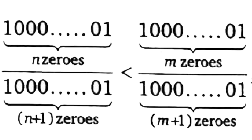Complete Solutions to EXERCISE (ONE OR MORE THAN ONE ANSWER IS/ARE CORRECT) of chapter SEQUENCE AND SERIES of Class 12 book with complete answers and questions
| Class 12 | MATHS |
| Chapter | SEQUENCE AND SERIES |
| VK JAISWAL | EXERCISE (ONE OR MORE THAN ONE ANSWER IS/ARE CORRECT) |
| Number Of Questions | 19 |
| Academic Year | 2023-24 |
If the first and `(2n-1)^(th)` terms of an A.P, a G.P and an H.P of positive terms are equal and their `(n+1)^(th)` terms are `a, b & c` respectively then
02:51View SolutionIf `a, b, c` are distinct positive real numbers such that the quadratic expression `Q_(1)(x) = ax^(2) + bx + c`,
`Q_(2)(x) = bx^(2) + cx + a, Q_(3)(x) = cx^(2) + x + b` are always non-negative, then possible integer in the range of the expression `y = (a^(2) b^(2) + c^(2))/(ab + bc + ca)` is05:23View SolutionIf a,b,c are in H.P, where `a gt c gt 0,` then :
06:54View SolutionIn an A.P. let `T_(r)` denote `r ^(th)` term from beginning, `T_(p) - (1)/(q (p +q)), T_(q) -(1)/(p(p+q)),` then :
07:04View SolutionWhich of the following statement (s) is (are) correct ?
View SolutionIf a,b,c are in 3 distinct numbers in H.P. `a,b,c gt 0,` then :
07:56View SolutionAll roots of equation `x ^(5) -40 x ^(4) + alphax ^(3) + beta x ^(2) + gamma x + delta =0` are in G.P. if the sum of their reciprocals is 10, then `delta` can be equal to :
03:09View SolutionLet `a _(1), a_(2), a_(3)…….` be a sequence of non-zero rela numbers with are in A.P. for `k in N.` Let `f _(k)(x) =a_(k ) x ^(2) + 2a _(k+1) x + a _(k+2)`
09:46View SolutionGiven a,b,c are in A.P. b,c,d are in G.P. and c,d,e are in H.P. if `a =2 and e =18,` then the possible value of 'c' can be :
02:15View SolutionThe number `a, b, c` in that order form a term A.P and `a + b + c = 60.` The number `(a-2), b, (c + 3)` in that order form a three G.P. All possible values of `(a^2 + b^2 + c^2)` is/are
03:36View SolutionIf `(x ^(2) +x+1) + (x^(2) + 2x +3) + (x^(2) + 3x +5) + ….. + (x ^(2) + 20x + 39) =4500,` then x is equal to :
07:06View SolutionFor `Delta ABC, ` if `81 + 144 a ^(4) + 16b ^(4) + 9c ^(4) =144` abc, (where notations have their usual meaning), then :
05:29View SolutionLet `x,y,z in (0, (pi)/(2))` are first three consecutive terms of an arithmatic progression such that `cos x + cos y + cos x =1 and sin x + sin y + sin x = (1)/(sqrt2),` then which of the following is/are correct ?
10:02View SolutionIf the number `16, 20, 16, d` form a A.G.P. then d can be equal to :
03:33View SolutionGiven

then which of the following trueView SolutionIf `S_(r) = sqrt(r+ sqrt(r+sqrt(r+sqrt(......oo)))) , r gt 0` then which the following is\are correct.
05:41View SolutionConsider the A.P. `50,48,46,44 ……. If S _(n)` denotes the sum to n terms of this A.R. then
04:37View SolutionLet `S_(n)`be the sum to n terms of the series `(2)/(1 ^(2)) + (5)/(1 ^(2) + 2^(2)) + (7)/(1^(2) + 2^(2) + 3^(2)) + (9)/(1 ^(2) + 2^(2) + 3 ^(2) + 6 ^(2))+ …….` then
06:43View SolutionFor `Delta ABC, ` if `81 + 144 a ^(4) + 16b ^(4) + 9c ^(4) =144` abc, (where notations have their usual meaning), then :
05:29View Solution
EXERCISE (ONE OR MORE THAN ONE ANSWER IS/ARE CORRECT) questions and complete solutions for chapter SEQUENCE AND SERIES of VK JAISWAL MATHS (HINGLISH) of Class 12
